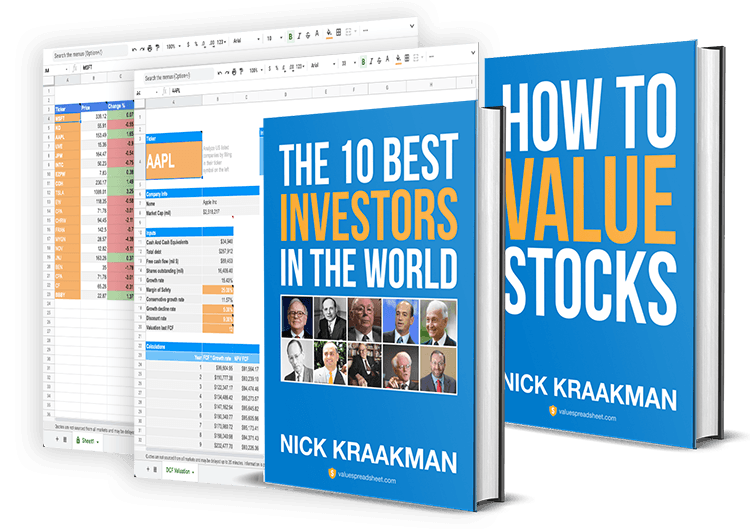Transcript
Hello, hello, everyone, welcome back to the Value Investing Bootcamp podcast.
I'm your host, Nick Kraakman.
I'm excited to talk with you again today, excited that you're tuning in. Thanks a lot, I really, really appreciate it.
I also really appreciate all the comments I received from you guys and the reviews you posted so far.
If you haven't done so, I would really appreciate it if you could leave a little review on iTunes because that would greatly help with the ranking of this podcast, so more people will be able to find out about it and learn to improve their investment strategies, and their investment decisions.
So, I would greatly appreciate that, will just take a little bit of your time, and you don't have to be extremely nice in your reviews, just be honest, and tell me what you think.
That's also what will benefit people mostly, of course, they just want your honest opinion.
Of course, I do really like to read positive reviews, but just be honest, and thanks a lot in advance if you're willing to put some time into writing one.
So, today, there's a very interesting story I want to talk with you about.
It's a story about castles which are protected by unbreachable moats.
At least this is the way Warren Buffett explains this.
So, imagine a castle with a lot of water around it and this water is also filled with sharks.
This piece of water is actually called the moat, for people who don't know what that is.
I didn't at first, so that's why I explain it.
Yeah, so let's say you have a castle with water around it and the water is filled with sharks or with Piranhas or whatever, dangerous fish, crocodiles, whatever.
This means that this castle will be hard to conquer, hard to destroy.
You could think about companies in the same way.
If you have a company which is protected by some sort of barrier, which is in regular terms called a sustainable competitive advantage, it means that it is hard to destroy this company, or hard to beat this company.
Examples of this are plentiful.
I mean, we can say a brand name is for example, a competitive advantage.
Coca Cola is still one of the best examples of a strong brand name.
Warren Buffett once said that if you give me a bag of money, $100 billion or something with the assignment "here is the money, go and get Coca Cola off the throne". He said I'd give the money back to you, because it can't be done.
The brand name is just too strong, the Coca Cola brand name is too strong.
This is a powerful statement.
I mean, if you can find companies like that and invest your money in them, it means that this company is likely to stay profitable for a very long time, because of their strong brand name.
There aren't many competitors that will be able to actually head on compete with this company and therefore eat away at their profit margins.
But again, brand name is just one of the many competitive advantages that the company can have.
For example, another one, if you look at Pfizer, for example, which is a company that makes or research and develops medicine, medications, and new drugs, and whatever, so they have patents.
And these patents say that no competitor is allowed to copy their products, which means that they have-- this only last for a couple of years, of course, that's why these drugs are so expensive, because these patents and this research are very expensive, and in this period in which the patent is valid, no competitor can copy it, so in that short period the company will try to earn all it’s money back.
But while these patents are valid, the company, if it has a profitable product for which there is a lot of demand, it is sort of safe from competition in that sense.
Of course, it is always dangerous, because these patents eventually end, so it is not a situation which will last forever.
Therefore, it's just always interesting to look at these companies and see what they still have in the pipeline, because if nothing new is coming out soon, if no new patents are issued continuously, eventually their competitive advantage will be gone and they will be open to fierce competition.
Another interesting competitive advantage is so called lock-in effect.
So, let's say you have Oracle.
Oracle, it creates software and database systems, and it installs it in large corporations, and the lock-in effect means that companies are not able to easily switch providers.
For example, they have all their crucial applications running on the Oracle servers and using Oracle software, and it just will be a massive undertaking, and it will be extremely expensive for the company to switch to a different database provider.
So, Oracle sort of has this recurring revenue, and it is sort of certain that a large, large percentage of its customers will never change providers, they will remain Oracle customers for a very long time.
Of course, this is a very strong situation for a company to be in, a very preferable situation for a company to be in.
You could also say that Facebook has some sort of a competitive advantage, because it has this huge network.
I mean, a social networking site only works if you have a lot of people on the network, so if all your friends are on there, and if people are actually engaging on the network, on the social network...
For example, Google Plus has a lot of users by now [currently has been phased out], however, they are less active, less engaged than on Facebook, although it is getting better.
However, this network effect still should not be overestimated, because we've seen it happen countless times before, for example with MySpace, which was highly successful, had a lot of users, active users, and then Facebook came along and just took all of them away.
So, while they do have a competitive advantage, the question is, is it sustainable?
And that is really the key, because if you look at examples like Groupon, they didn't really have a competitive advantage to begin with.
I mean, they had a nice service, and sure, they did it in a in a great way.
A lot of people enjoy their services and the offerings they make.
The product problem is though that it's pretty easy for competitors to copy this service, and you've seen it, a lot of other companies, similar companies started to spring up all of a sudden, so they faced serious competition, and that's why Groupon is not an interesting investment, at least not for me, and it shouldn't be for you as a value investor either, because they don't really have a competitive advantage, at least not a strong sustainable one.
Another example might be Crocs, the extremely ugly shoes, sorry, if any of you own them, but that's just my opinion [I actually own a pair now and love them...].
I mean, they were hyped at some point, people started buying them like crazy, they made a bit of profit out of it, but it's just a hype, it's just a fad.
It's a little trend that soon ended and now their profits are plummeting, and they actually made a significant loss the last quarter, it's just not sustainable.
So, always keep your eyes open if you're analyzing a company, see whether they have some sort of advantage over their competitors which is not easy to replicate and which is sustainable, above all, which can last over time.
This means that they will be able to remain profitable over time, and these are the companies you want to be looking for.
So, I hope this was useful, and yeah, I hope to see you in the next episode.
Send me an email at
Okay, thanks a lot for listening again, and I really appreciate it.
So, I'll see you in the next episode.
If you enjoyed today's show, head over to ValueInvestingBootcamp.com to find out more on how you can invest like the pros, manage your own portfolio with confidence, and consistently earn mind boggling returns on the stock market.



